What is missing in the body if you constantly want potatoes?
Potatoes are a popular but extremely controversial product. Most nutritionists and fitness trainers do not recommend it in any form, as it is high in calories and is not believed to provide any benefits to the body.
Is this true and what should you do if you constantly want potatoes? Looking for a replacement for your favorite vegetable or still eating it? You will find detailed answers to these and other questions about the benefits and harms of potatoes in our article.
Chemical composition of potatoes
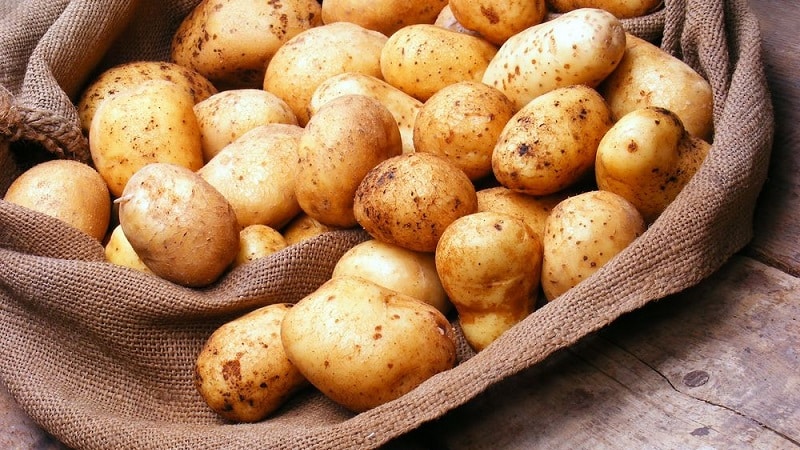
Potatoes have a rich composition - they contain vitamins, microelements, and vegetable protein.
The tubers contain:
- vitamin PP;
- beta-carotene;
- vitamin A;
- vitamins B1, B2, B6, B5, B9 (folic acid);
- vitamin C;
- vitamin E.
Of the macroelements, the vegetable is rich in calcium, magnesium, sodium, phosphorus, sulfur and chlorine.
There are also a lot of microelements:
- iron;
- zinc;
- iodine;
- copper;
- manganese;
- selenium;
- chromium;
- fluorine;
- molybdenum.
Experts attach great importance to vitamins B1, B2, B6 - they are necessary to maintain immunity, are responsible for lipid metabolism, the condition of the skin, and participate in the processes of inhibition and excitation in the central nervous system. If these vitamins are not enough, sleep and appetite are disrupted, the skin begins to peel, and in serious cases, anemia even develops.
Vitamin C (ascorbic acid), which baked potatoes in their skins are especially rich in, is necessary for the full functioning of the immune system and helps in the absorption of iron and minerals.With a lack of vitamin C, blood vessels and capillaries become fragile and thin, which leads to nosebleeds and, in old age, to an increased risk of stroke.
Potassium, which is more abundant in potatoes than in bananas, regulates blood pressure and is also involved in water metabolism and the processes of nerve impulses. A lack of potassium leads to decreased mood, swelling, deterioration of hair and nails, and decreased or increased blood pressure.
Reference. Silicon is necessary for normal brain function, prevents fragility and brittleness of bones and joints, and is needed for skin elasticity, strong nails and beautiful hair.
Calorie content, BJU, glycemic index of potatoes
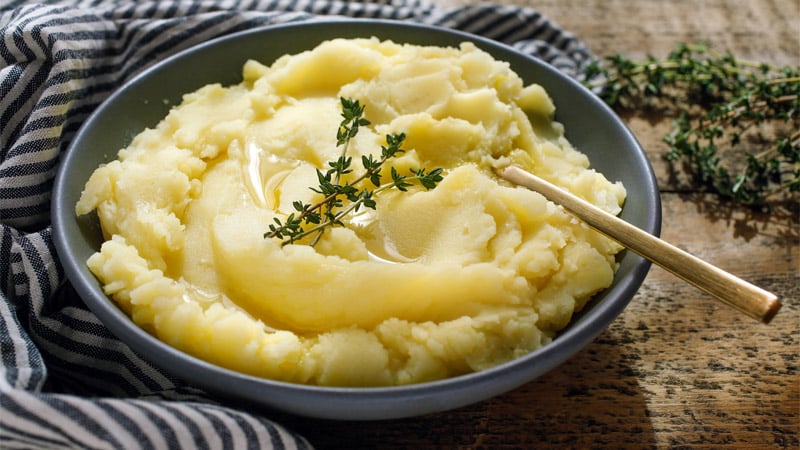
Calorie content of potatoes, boiled or baked, low - it is in this form that dieters and pregnant women are advised to eat it.
Potato composition:
- calorie content – 77 kcal;
- proteins – 2 g;
- fats – 0.4 g;
- carbohydrates – 16.3 g;
- organic acids – 0, g;
- dietary fiber – 1.4 g.
The glycemic index (GI) is considered high and varies depending on the cooking method:
- boiled cold potatoes have a GI of 50;
- hot boiled without peel – 89;
- baked in peel – 73-85;
- fried in vegetable oil – 60-75;
- mashed potatoes – 85-95.
For patients suffering from diabetes, the product is not completely prohibited, but fried potatoes and puree It is not advisable to use it with butter and milk.
Useful properties of potatoes
The vegetable contains protein that is well absorbed by the body and all the amino acids found in plants.
The norm for tuber consumption by a healthy person is about 300 g per day. When consuming baked or stewed potatoes in this quantity, the body completely covers the need for carbohydrates, phosphorus, potassium and silicon, and practically covers the need for iron, vitamin E and B vitamins.
- Vitamin C content it is highest in young potatoes, harvested a few weeks ago – about 20 mg. Over the winter, the vitamin content drops, but even in spring potatoes, about 7-9 mg remains in 100 g, which is also not bad.
- Cellulose The vegetable does not irritate the mucous membrane of the stomach and intestines, so doctors allow boiled and baked potatoes to be eaten even by patients with exacerbations of peptic ulcers and gastritis.
With reasonable consumption of potatoes, cholesterol in the liver and blood serum returns to normal, and potassium removes excess water from the body. Therefore, potatoes are included in the diet of people prone to edema, suffering from kidney, vascular and heart diseases.
What substances are missing in the body if you want potatoes?

A deficiency of substances in the body is not diagnosed based on craving for a certain product alone, but if other symptoms are added to the acute, constant desire to eat potatoes, You should be wary and get tested or see a doctor.
- Dull nails, hair, weakness, combined with an intolerable desire to eat potatoes may indicate a lack of silicon, magnesium or calcium.
- Constant colds, lethargy, low-grade fever without signs of a cold indicate a decrease in immunity and a lack of vitamin C or selenium.
- Insomnia, loss of appetite, anxiety – deficiency of B vitamins.
- Swelling, slight fluctuations in pressure, weather dependence - lack of potassium.
- Pallor, constant desire to sleep – lack of iodine or iron.
Often those who adhere to strict diets or actively engage in sports crave potatoes intolerably. In this case, the body simply does not have enough calories and glucose, and it requires a familiar and favorite product to cover this deficit.
How can they be replenished?
First of all, we recommend visiting a therapist and talking about your symptoms. Perhaps you cannot limit yourself to vitamin therapy alone and more serious treatment is required.
If a person is generally healthy, but the symptoms do not go away, potatoes can be replaced or supplemented with more healthy products that will quickly replenish the lack of vitamins and microelements.
- if there is a lack of potassium, magnesium, selenium, add apricots, bananas, raspberries, blackberries, cherries to the diet;
- if there is a lack of B vitamins - fish, seafood, nuts, sunflower seeds, avocados;
- for silicon deficiency - pistachios, legumes, buckwheat and barley;
- vitamin C – citrus fruits, sauerkraut, berries;
- calcium – fermented milk products, sesame;
- E – vegetable oils.
Important! Do not forget about multivitamin complexes that your doctor prescribes based on your symptoms and test results.
Why do pregnant women often crave potatoes?
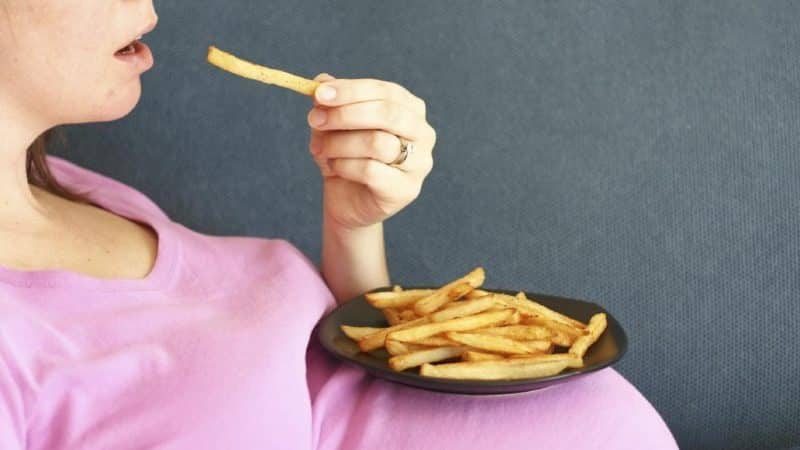
If the expectant mother has low blood pressure, hair is thinning and dull, mood swings are severe, and swelling is bothersome, most likely the body does not have enough potassium. In this case, the desire to eat a portion of potatoes may be intolerable, since the body understands that it is from this tuber that it will receive the missing microelement.
If a woman sleeps poorly, is constantly worried, and the skin of her face and scalp is peeling, the problem may be a lack of B vitamins, especially folic acid, which are also found in large doses in potatoes.
Often, iodine deficiency or anemia also causes a “craving” for vegetables - iodine and iron from potatoes are well absorbed, and the need for microelements in pregnant women increases significantly.
But the most basic reason for the desire to try conventionally unhealthy food is a lack of calories. Many women, not wanting to gain weight during pregnancy, strictly limit themselves in the size of portions. The body, which does not receive enough food, begins to demand familiar and guaranteed high-calorie food.
Can pregnant women eat it and in what form (benefits and harms)
Doctors do not prohibit pregnant women who do not suffer from diabetes from eating potatoes. The exception is expectant mothers who quickly gain weight, which can affect the health of the woman and baby. In this case, all high-calorie foods, including most potato dishes, are excluded.
Boiled or stewed
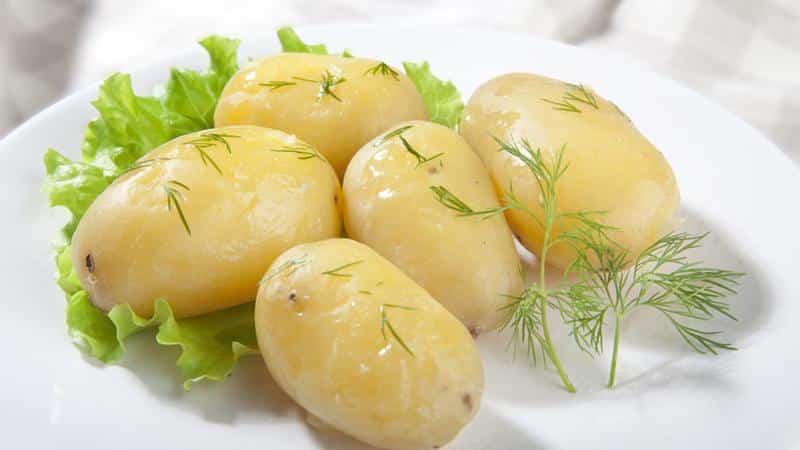
Boiled Potatoes with vegetable oil or stewed with other vegetables will bring virtually no harm to the expectant mother. The main thing is not to season the finished dish with rich sour cream or cream, but sprinkle with herbs and add a little pumpkin or flaxseed oil.
In uniform
Baked in their jackets is the healthiest type of potato for an expectant mother. All vitamins are stored under the skin, especially potassium, iodine, selenium and calcium, which are essential for the baby’s nervous system and bones.
Glycemic index of baked tuber is the lowest, which allows you to eat it with vegetable salads and boiled poultry several times a week.
Fried
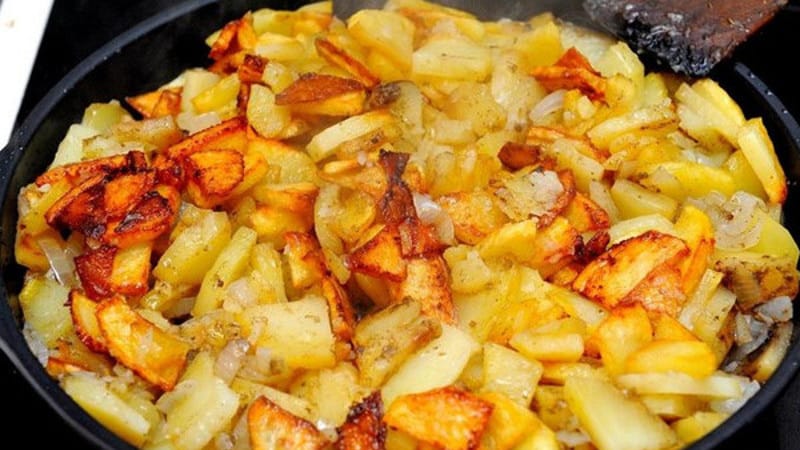
Fry potatoes on vegetable oil or pork fat is not recommended for the expectant mother. This product contains a lot of calories, when frying, carcinogens are released, and an excessive amount of salt in food leads to swelling and kidney problems.
If the craving for fried potatoes is irresistible, you can cook them gently (without dark crusts), but be sure to eat them with a salad of fresh vegetables and no more than once a week.
French fries
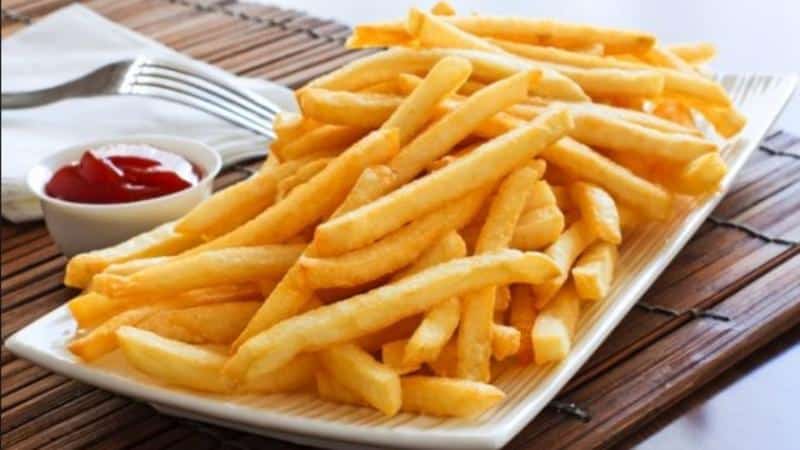
In establishments serving fast food, it is strictly prohibited for an expectant mother to buy French fries. In addition to salt and carcinogens, such a product contains many chemical additives - taste enhancers, flavorings and additives that cleanse the oil of soot and impurities.
If you have a deep fryer at home, you can cook your favorite food if the oil and potatoes are of high quality. Instead of salt, the finished dish can be sprinkled with finely chopped herbs.
Important! Even expectant mothers are allowed to eat homemade French fries only in small quantities (100–150 g at a time) and no more than once a week.
Contraindications to eating potatoes
Contraindications There’s not much to eating a starchy vegetable.
People suffering from diabetes should limit its consumption in stewed meat or in the form of puree. Fried potatoes and french fries are prohibited for any diseases of the liver, kidneys and blood vessels.
In the acute stage of gastritis, potatoes are consumed only baked or stewed.
Tips and recommendations from nutritionists

Nutritionists advise limiting the consumption of potatoes or replacing them with yams - the popular American tuber has a lower GI.
If yams are not available, and a person cannot imagine life without potatoes, follow simple rules:
- choose small red potatoes and cook them with their skins on, which slows down the absorption of glucose;
- instead of French fries, cook tubers in the oven, steam or stew with other vegetables;
- watch the quantity - a portion of a vegetable should not exceed a quarter of the food portion eaten;
- do not combine the tuber with fatty meat, fish or meat products - the base should be legumes, vegetables or poultry.
The basic rule is not to season the finished dish with fatty sour cream, giving preference to vegetable oils (linseed, olive, pumpkin).
Conclusion
Potatoes are a healthy vegetable if cooked correctly. Baked in the peel, it saturates the body with potassium, iodine, iron, calcium, vitamins B, C and E. If you constantly want potatoes, you should listen to your body and cook the vegetable in the oven or steam, adding a green salad and a piece of chicken or cheese.
And nutritionists consider this set of microelements to be useless:
The tubers contain:
vitamin PP;
beta-carotene;
vitamin A;
vitamins B1, B2, B6, B5, B9 (folic acid);
vitamin C;
vitamin E.
Of the macroelements, the vegetable is rich in calcium, magnesium, sodium, phosphorus, sulfur and chlorine.
There are also a lot of microelements:
iron;
zinc;
iodine;
copper;
manganese;
selenium;
chromium;
fluorine;
molybdenum.
Why are such nutritionists and fitness trainers...